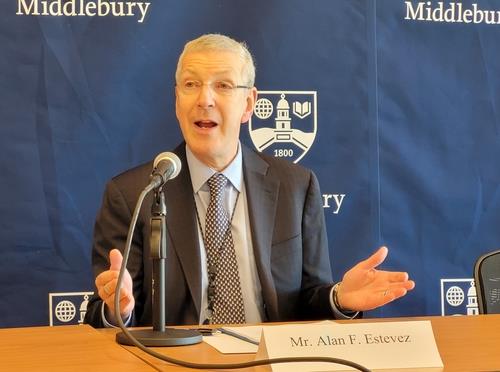The United states, South Korea and other allies are in "preliminary" talks over the idea of creating a new export control regime to prevent cutting-edge technologies, including semiconductors and quantum computing, from being transferred to potential adversaries, a U.S. official said Tuesday.
Speaking at a forum, Alan Estevez, under secretary of commerce for industry and security, stressed that a new regime on those technologies is needed as existing multilateral regimes do not operate at the current pace of a rapid technological change.
"We and our allies talk about how we develop a regime that can act at that speed to protect ourselves and manage the technology so that we can protect ourselves from our adversaries," he said. "Those are discussions that are ongoing within the (U.S.) government and with our allies."

Taking quantum space as an example, Estevez said that existing regimes, especially the Wassenaar Arrangement (WA), do not proceed at the speed of technological shifts. WA is designed to promote responsibility in transfers of conventional arms and dual-use goods to prevent the acquisition of those items by terrorists.
"I need to be able to act at the speed of quantum," he said. "That is the speed by which we need to act and so we need to get together."
Asked to elaborate on the ongoing discussions on a new regime, the official said they are "preliminary," but noted the importance of South Korea partaking in such a regime.
"I don't think we could do it without Korea being involved," he said.
The forum was jointly hosted by the Korean Security Agency for Trade and Industry under South Korea's Trade, Industry and Energy, the James Martin Center for Nonproliferation Studies D.C. Office, and the Strategic Trade Research Institute.
Among the panelists was Gonzalo Suarez, deputy assistant secretary of state for international security and nonproliferation.
Suarez highlighted the need for South Korea to ensure its sensitive technologies and products will not be used in China's military modernization efforts.
"We also cannot ignore the bullying and militarized nature of Chinese foreign policy," Suarez said.
"It is important for countries in the region, like Korea, to ensure that Korean-origin sensitive items do not end up in Chinese military modernization programs because that will be a source of instability," he added.
The official called attention to China's "military-civil fusion" strategy aimed at eliminating barriers between civilian commercial research sectors and military sectors to build a technologically advanced military.
"So, this really makes it incredibly difficult for export controllers to have any kind of confidence that an item is going to go to a legitimate end use in China," Suarez said.
Expounding on the need for export controls, Suarez said that emerging technologies hold "tremendous promise" for humanity, but could potentially be used for purposes of instability and human rights violations.
Also present at the forum was Kim Young-jae, economic minister at the South Korean Embassy in Washington.
Touching on the Biden administration's recently announced guidance on "foreign entities of concern (FEOC)" under the Inflation Reduction Act, Kim said that the FEOC rule "does not seem to fully reflect the reality of the business."
Under the rule, beginning in 2025, an EV eligible for tax credits may not contain any critical minerals that were extracted, processed or recycled by an FEOC. Starting next year, an eligible EV may not contain any battery components that were manufactured or assembled by an FEOC.
"Once this provision takes effect, the likely outcome will be that a number of eligible electric vehicles will be significantly reduced," Kim said. "We believe it will be better for us to make more realistic approaches or else stakeholders may simply give up and continue to depend on China for sourcing cheap minerals."
The strict FEOC rule appears aimed at reshaping EV supply chains away from China amid an intensifying Sino-U.S. rivalry, observers said. The rules are expected to affect the South Korean EV industry that relies on China's supply chains.

